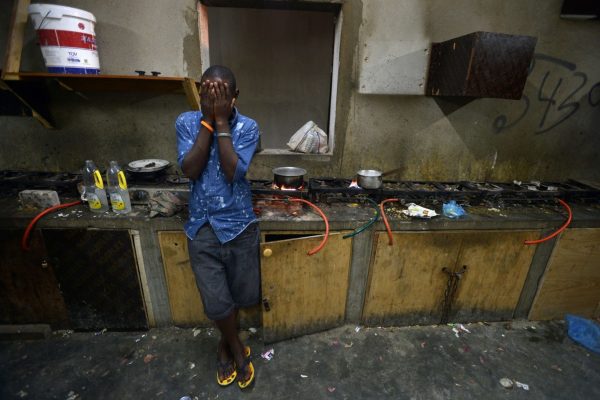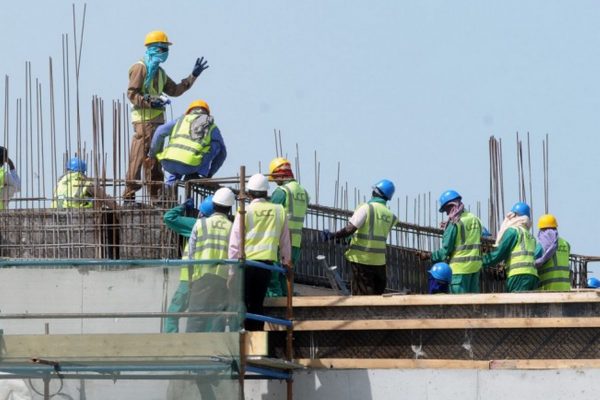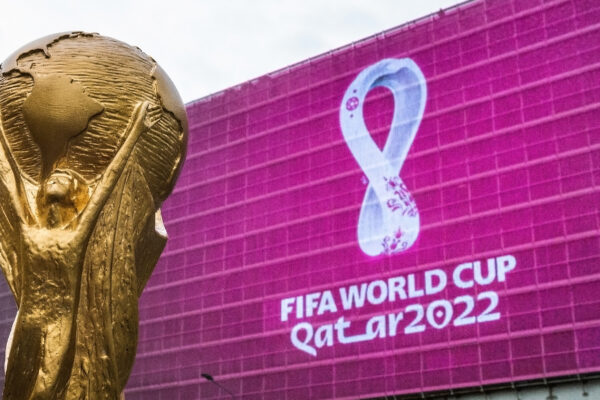With the upcoming 2022 FIFA World Cup being held in Qatar, the new emblem was revealed in Doha and in 27 other major cities across the world just yesterday. The design, shaped as a woollen shawl, was created to reflect “Arab culture”. Beating the United States, Australia, Japan, and South Korea, Qatar won the right to host the 2022 World Cup in a 2010 vote.

Despite the celebrations that took place with Doha’s revealing of its new emblem, the country remains heavily criticized for its atrocious abuse and human rights violations towards its migrant workers, many of whom are laboring over the future World Cup stadiums.
In a shocking report by Amnesty International, who conducted the survey in early 2015, it was revealed that migrant workers building the Khalifa stadium were forced to live in shanty-towns, were reportedly forced to pay enormous sums of recruitment fees, and have had their wages withheld as well as their passports confiscated from them.

Interviewing the migrant men, Amnesty found that the majority of them no longer had access to their own passports, and 88 of them had been denied the right to leave the country of Qatar. Many also admitted to their wages not being paid to them for three or four months in a row, with evidence of many being “subjected to forced labor”. Most reported threats from employers of wages being withheld, being deported from the country, or not being allowed an exit permit to leave Qatar to visit family or leave the job.
One man told Amnesty:
My life here is like a prison. The work is difficult, we worked for many hours in the hot sun. When I first complained about my situation, soon after arriving in Qatar, the manager said, ‘If you want to complain you can, but there will be consequences. If you want to stay in Qatar, be quiet and keep working.’ Now I am forced to stay in Qatar and continue working.”
According to Human Rights Watch, thousands of migrant workers in Qatar are in severe danger of working in extreme conditions, especially in the summer when temperatures in the Gulf state can reach up to 50 degrees Celsius, or 122 degrees Fahrenheit. HRW has claimed that hundreds of migrant workers are dying each year in Qatar under harsh working conditions, with authorities in Qatar reportedly under-reporting the issue or denying it completely.
In 2012, while the construction for the World Cup stadiums were beginning to get into full swing, the Qatari government admitted that 520 people from Bangladesh, India, and Nepal had died in the country. 385 people from this total, making up almost 75%, had died from “causes that the authorities neither explained nor investigated”, according to HRW.
Later that year, after numerous criticisms from human rights groups, the Qatari government told HRW that 35 workers had died “mostly from falls, presumably at construction sites”. HRW continues to look into the deaths of these migrant workers, many of whom are sent back home to be buried with little or no information as to how they died.

Many of these deaths are simply explained as to be the result of “heart attacks” by the Qatari authorities as well, as in the case of Jaleshwar Prasad, 48, whose death was explained by the state hospital as being of a cardiac arrest, and that “work duties were not a contributory factor”. HRW countered this claim by investigating the temperatures in Qatar the day before Prasad died, the 26th of April 2016, realizing it had been at a dangerous 39 degrees Celsius while he was working. Many migrant workers like Prasad continue to suffer and even die when forced to continue work in dangerous temperatures throughout the spring and summer.
While the government of Qatar has made a few tentative moves towards showcasing they protect the rights of workers, human rights groups continue to accuse the country of violating its own laws and international laws on basic human rights. As of now, Qatari law prohibits the retention of passports, however rights groups like Amnesty continue to find cases where the practice of withholding passports are widespread.
In October of 2017, Qatar’s government publicly admitted that it will work with the International Labor Organization on the reformation of the country’s kafala system, which is used to monitor migrant laborers by putting them under the “protection” of an in-country sponsorer. In late 2018, the emir of Qatar also issued a law abolishing, in most cases, the ability for employers to deny workers an exit permit, which has been used to prevent workers from taking holidays or leaving the job. These tentative moves, again, has had little impact on the overall abuse being documented against migrant workers in the country, and human rights groups continue to monitor the harrowing conditions within the country for migrants.
As the date for the World Cup in Qatar approaches, the abuse of the migrant workers building the stadiums that will hold million-dollar paid football stars and privileged football fans continues to go unchecked. Hundreds continue to be exploited even after death, as they are sent back to their native homes in coffins with only the shattered dreams and hopes of their families.





